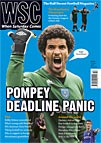 FC Twente's new creative midfielder wants to be known just for his football. Jonathan Wilson reports on a reluctant trailblazer
FC Twente's new creative midfielder wants to be known just for his football. Jonathan Wilson reports on a reluctant trailblazer
“I have packed,” Nashat Akram said with a smile, “my diplomatic passport.” The joke was apt, and was delivered as a friendly way of ending the conversation, but there was also a tiredness in the Iraq midfielder’s voice as he made it. Nashat understands why the question keeps being asked, and recognises the need to provide some sort of answer, but he is clearly also sick of constantly being asked whether he is an ambassador for Iraqi football.
Much as he would love people to consider him merely as a player, the fact remains that he is a pioneer, and by joining Steve McClaren’s FC Twente from the Qatari side Al-Gharafa, he has become the first Iraqi to play for a top-flight team in western Europe. Inevitably, that means he must carry a burden. He can never be just Nashat Akram, midfielder; he will always be Nashat Akram, Iraqi midfielder.
There is a price to pay for that, beyond the attentions of journalists: earlier this year Nashat’s brother Hassan was taken hostage by kidnappers seeking a ransom from a footballer whose wealth, while modest by that of western players, far outstrips anything of which the average Iraqi can conceive. He was, fortunately, released unharmed following an operation by Iraqi police.
Hawar Mulla Mohammed, Nashat’s sometime international team-mate, last season became the first Iraqi to score in the Champions League, getting Anorthosis Famagusta’s third in their 3-1 win over Panathinaikos in October.
That, perhaps, slowly began the process of raising the image of Iraqi football. Still, even after the Asian Cup success in 2007, ask most people about Iraqi football and they will speak of Uday Hussein and the various ingenious punishments he used to inflict on players after defeats during his days as president of the local federation.
Hawar has since re-turned to the Middle East with the Iranian side Persepolis, leaving Nashat to fly the flag alone. “Yes, I’m the first Iraqi player to play in Europe at a high level,” he said. “And Twente are a very good team. Last season they were second in the cup and second in the league and they qualified for the Champions League. I’m so proud to play for them. I want to help the club get good results.”
Had things worked out differently, Nashat might have been part of the revolution at Manchester City. Sven-Göran Eriksson wanted to sign him in January 2008, only for the deal to fall through over a work permit. “At that time I was very sad because it was a big chance to play in the best league in the world, the Premier League,” he said. “And Manchester City are a very big club with a lot of fans. But this is football. You do your best and you never know, and I still hope to play in England some day.”
So, given he wants to be judged as a footballer, how good is he? In a defensive Iraq side at the Confederations Cup, he was an isolated creative presence in a midfield set up largely to prevent the opposition scoring. His first touch and his range of passing were good, but given Iraq’s defensiveness and their failure to score a single goal, it’s hard to say how effective he was.
Iraq’s coach at the time, Bora Milutinovic, admits to doubts as to whether he can succeed in the Dutch league. “When you go to other countries you need to know which country you’re going to,” he said. “In Holland the game is very fast, running, physical. You have to be in good situation with the ball, without the ball. Maybe Nashat could play in France, play on the right because he is fast. I hope at Twente he succeeds, but he needs to change the way he plays. He has good technique, good vision, but he needs to be dynamic… it’s not about physique, but he needs to go up and down.”
At 24, he is still young enough to develop and seems genuinely excited by the prospect of learning from Steve McClaren. “He’s a very big name, a very big coach,” he said. “I hope to continue with him and it’s a big challenge for me to show people I have good quality and good technique to play at that level." But no bigger challenge surely, than he transition from playing for Uday Hussein to Steve McClaren.
From WSC 272 October 2009